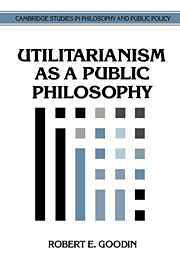Book contents
- Frontmatter
- Contents
- Preface
- Acknowledgments
- PART I INTRODUCTION: MORAL BASES OF STATE ACTION
- PART II MORALITY, PUBLIC AND PRIVATE
- PART III SHAPING PRIVATE CONDUCT
- PART IV SHAPING PUBLIC POLICIES
- 8 Liberalism and the best-judge principle
- 9 Laundering preferences
- 10 Heroic measures and false hopes
- 11 Theories of compensation
- 12 Stabilizing expectations
- 13 Compensation and redistribution
- 14 Basic income
- 15 Relative needs
- 16 What is so special about our fellow countrymen?
- 17 Nuclear disarmament as a moral certainty
- 18 International ethics and the environmental crisis
- References
- Name index
13 - Compensation and redistribution
Published online by Cambridge University Press: 28 January 2010
- Frontmatter
- Contents
- Preface
- Acknowledgments
- PART I INTRODUCTION: MORAL BASES OF STATE ACTION
- PART II MORALITY, PUBLIC AND PRIVATE
- PART III SHAPING PRIVATE CONDUCT
- PART IV SHAPING PUBLIC POLICIES
- 8 Liberalism and the best-judge principle
- 9 Laundering preferences
- 10 Heroic measures and false hopes
- 11 Theories of compensation
- 12 Stabilizing expectations
- 13 Compensation and redistribution
- 14 Basic income
- 15 Relative needs
- 16 What is so special about our fellow countrymen?
- 17 Nuclear disarmament as a moral certainty
- 18 International ethics and the environmental crisis
- References
- Name index
Summary
Compensatory justice is profoundly conservative, standardly serving to restore some status quo ante. The essential aim of redistributive justice, in contrast, is to alter those antecedent distributions which compensatory justice is at such pains to re-create. The two notions thus seem unalterably at odds, compensation striving to preserve what redistribution seeks to change and redistribution altering what compensation strives to preserve.
If forced to choose, rarely will it be compensatory justice that we choose to abandon. We are not prepared to let wrongs go unrighted, merely on the ground that the wronged are far richer than the wrongdoers; we are not prepared to deny workers compensation for accidental injuries at work, merely because they were being overpaid anyway. Principles of compensatory justice in this way have us firmly in their hold, and insofar as they do, principles of redistributive justice (seen as their polar opposites) have trouble getting any grip at all.
Contemporary contractarians of a right-wing cast make much of that point. For them, the permissibility of interventions is predicated upon the agreement (real or hypothetical) of everyone affected; and people's agreement in turn is predicated on compensation (direct or indirect, explicit or implicit) for any losses. From that pair of propositions, writers such as Nozick and Epstein conclude that any genuinely redistributive interventions must be decisively blocked. Those antiredistributivist conclusions follow, however, not from any positive arguments (which are no more than arguments in favor of compensation) but merely from the further supposition that redistribution is necessarily the antithesis of compensation.
- Type
- Chapter
- Information
- Utilitarianism as a Public Philosophy , pp. 207 - 227Publisher: Cambridge University PressPrint publication year: 1995
- 1
- Cited by



